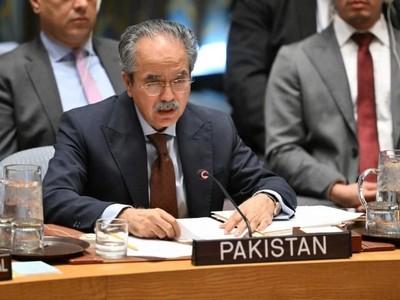
Ambassador Asim Iftikhar Ahmad warns UNSC of ‘grave threat to world peace’ posed by Israeli strikes on Iran
Celina Ali
Islamabad: Israel’s strikes on Iranian nuclear and military facilities constitute a “grave danger and a serious threat” to the peace, security, and stability of the entire region and beyond, Pakistan told the United Nations Security Council during an emergency session convened on this week.
Israel earlier launched widescale strikes on Iran, claiming that it targeted nuclear facilities, ballistic missile factories, and military commanders. Iran’s ambassador told the UN that 78 people had been killed and 320 wounded in the first wave of strikes by Israel. Israeli Prime Minister Benjamin Netanyahu said the attacks were the beginning of a prolonged operation to prevent Tehran from building an atomic weapon.
Iranian media and witnesses reported explosions, including at the country’s main uranium enrichment facility at Natanz, Reuters reported. Iran’s elite Revolutionary Guards corps said its top commander, Hossein Salami, was killed, and state media reported the unit’s headquarters in Tehran had been hit. Six Iranian nuclear scientists were killed, Iranian state media reported.
In his remarks, Permanent Representative of Pakistan to the UN Ambassador Asim Iftikhar Ahmad, strongly condemned the “unjustified and illegitimate” aggression by Israel against Iran, reaffirming that Islamabad stood in resolute solidarity with the Iranian government and people.
Iran’s Foreign Minister Abbas Araghchi requested the Security Council meeting, saying Israel “has now crossed every red line, and the international community must not allow these crimes to go unpunished”.
Among those supporting the request for a meeting were Algeria, Pakistan, China and Russia.
Amid escalating tensions, the Pakistani envoy urged the Security Council to discharge its responsibility to uphold international law and stop this aggression immediately.
Ambassador Ahmad strongly called for the resolution of the crisis through dialogue and diplomacy
Briefing the Security Council, UN Under-Secretary-General for political affairs Rosemary DiCarlo, told ambassadors that the repercussions of the attacks were already reverberating.
“I reaffirm the Secretary-General’s condemnation of any military escalation in the Middle East,” she said, urging both Israel and Iran to exercise maximum restraint and “avoid at all costs a descent into deeper and wider regional conflict”.
She also noted that the military escalation came just as “some significant diplomatic developments” were unfolding, including the planned resumption of United States-Iranian talks in Oman at the weekend. Latest reports indicate that Iran will no longer attend.
DiCarlo urged parties to stay the diplomatic course. “A peaceful resolution through negotiations remains the best means to ensure the peaceful nature of Iran’s nuclear programme,” she said.
“We must at all costs avoid a growing conflagration which would have enormous global consequences.”
Also briefing the Council, International Atomic Energy Agency (IAEA) Director General Rafael Grossi said his agency was in constant contact with the Iranian Nuclear Regulatory Authority to assess the status of affected facilities and determine broader impacts on nuclear safety and security.
He stressed that nuclear sites must never be targeted — under any circumstances.
“Such attacks have serious implications for nuclear security, nuclear safety and safeguards, as well as regional and international peace and security,” Grossi said.
He stands ready to travel to the region at the earliest opportunity, he added, to assess the situation and support safety, security and non-proliferation efforts in Iran.
“It is clear that the only sustainable path forward for Iran, for Israel, the entire region and the international community is one grounded in dialogue and diplomacy to ensure peace, stability and cooperation.”
Grossi concluded by offering the IAEA as a neutral platform where “facts prevail over rhetoric” and where technical engagement replace escalation.
“I reaffirm my personal and the agency’s readiness to facilitate dialogue and support efforts that promote transparency, security and the peaceful resolution of nuclear issues in Iran.”
Pakistan came out strongly in support of Iran’s right to self-defence, following Israeli military strikes on Iranian targets, distinguishing its position from most other regional and global powers.
The Pakistani position was more than a diplomatic footnote; rather a bold assertion of principle in a region accustomed to cautious ambiguity.
When the Foreign Office described Israel’s action as “unjustified and illegitimate aggression” that violated “the sovereignty and territorial integrity of the Islamic Republic of Iran” and flouted the UN Charter, it did not stop at condemnation.
It explicitly mentioned Article 51: “Iran has the right to self-defence under Article 51 of the UN Charter.” The statement further urged the world to “hold the aggressor accountable for its actions.”
In a call with the Iranian foreign minister, Foreign Minister Ishaq Dar condemned the blatant Israeli aggression and reiterated Islamabad’s strong support to Iran for the sake of peace in the region.
He also conveyed the deepest sympathies on the loss of many precious lives in Israeli attacks on Iranian territory.
